1. Overview
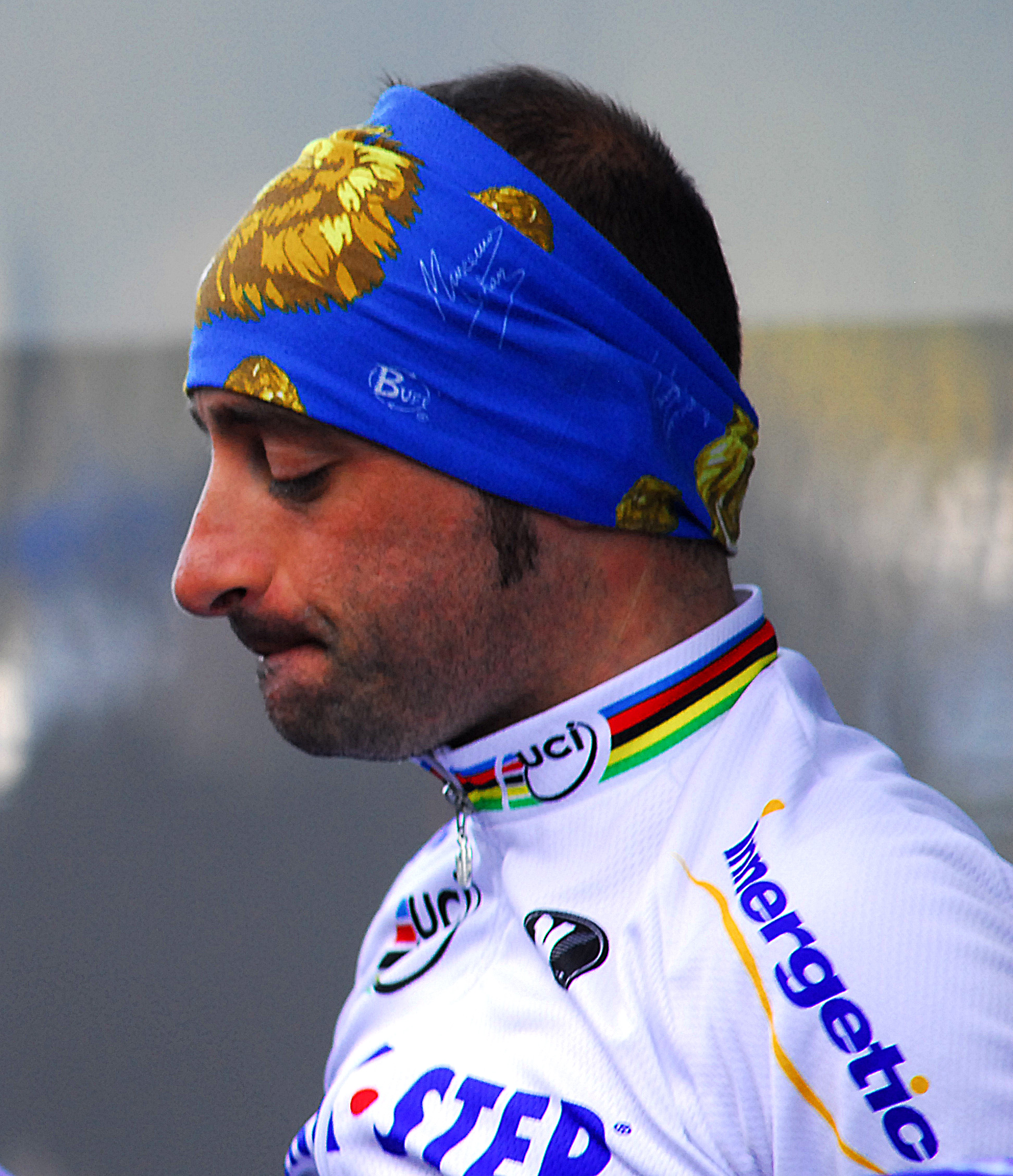
Paolo Bettini, born on April 1, 1974, is an Italian former champion road racing cyclist and a former coach of the Italian national cycling team. Widely regarded as the premier classics specialist of his generation and one of the most formidable of all time, Bettini achieved an extraordinary array of honors throughout his career, notably securing gold medals in the 2004 Athens Olympics road race and clinching consecutive World Road Race Championships in 2006 and 2007. His aggressive and sudden attacks, combined with his powerful sprinting style, earned him the distinctive nickname Il Grillo (Il GrilloThe CricketItalian). He is one of the few cyclists to have won all three major World Cup series (Milan-San Remo, HEW Cyclassics, Clásica de San Sebastián) in a single season.
2. Early Career
Paolo Bettini grew up with his family on the Tuscany coast in Italy. His journey into cycling began at the remarkably young age of seven, and he quickly demonstrated his prodigious talent by winning 23 of his first 24 races. His first bicycle was a testament to his humble beginnings, featuring a secondhand frame that his father, Giuliano, had personally painted orange, with components salvaged from other bikes. He was encouraged to start racing by his brother.
In 1996, Bettini showcased his potential on the international stage by finishing fourth in the world under-23 road championship, placing behind three fellow Italian cyclists: Giuliano Fugeras, Roberti Sgambelluri, and Luca Sironi. The following year, in 1997, he officially turned professional, joining the MG-Technogym team. During his initial professional years, Bettini primarily served as a domestique for the established rider Michele Bartoli. Bartoli, described as a "working class cyclist" destined to support others, benefited significantly from Bettini's assistance, winning the UCI Road World Cup in both 1997 and 1998. Bettini's dedication to his role as a domestique was evident, and in return, Bartoli provided him with valuable advice and guidance.
3. Professional Career
Bettini's professional career spanned over a decade, marked by a gradual ascent from a domestique to a dominant force in one-day races and a consistent contender in Grand Tours. His career saw him evolve into one of cycling's most dynamic and successful riders, particularly in the early 2000s.
In 1999, a significant turning point occurred when Michele Bartoli suffered a severe knee injury, which freed Bettini to pursue his own racing ambitions. He capitalized on this opportunity, winning Liège-Bastogne-Liège in 2000, a victory he celebrated by purchasing a 100.00 K EUR Porsche. That same year, he also secured a flat stage victory in the Tour de France, from Agen to Dax. After a period without wins, he triumphed in the 2001 Züri-Metzgete, out-sprinting Jan Ullrich at the finish.
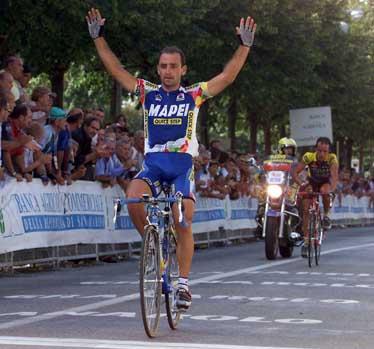
This burgeoning success, however, led to a notable feud with Bartoli. Their rivalry reached its peak at the 2001 World Championship in Lisbon, Portugal, where Bartoli controversially refused to lead Bettini into a strong position for the sprint finish, ultimately allowing Spaniard Óscar Freire to claim the victory.
3.1. UCI World Cup Dominance
The 2002 season marked a significant breakthrough for Bettini, as he emerged as a dominant force in the UCI Road World Cup series. He narrowly missed victory in Milan-San Remo, being caught in the final kilometers. However, his strong performance, including a 1-2 finish with Stefano Garzelli at Liège-Bastogne-Liège, positioned him in a fierce competition with Johan Museeuw for the World Cup title. Museeuw had won Paris-Roubaix with a 31 mile (50 km) solo breakaway and the HEW Cyclassics. Bettini's tactical prowess in the Giro di Lombardia ultimately secured him the 2002 World Cup. He also provided strong support for Mario Cipollini's victory in the UCI Road Cycling World Championship in Zolder, Belgium, that year.
Bettini's dominance continued into the 2003 season, which began with a strong performance at Milan-San Remo. He launched two attacks on the final hills leading into the finish, aided by Luca Paolini's crucial attack on the tricky descent. Despite an injury sustained at Gent-Wevelgem that forced him to miss several races until the Tour de France in July, Bettini quickly regained his form. He followed up with victories in the HEW Cyclassics, where he again bested Tour runner-up Jan Ullrich, and the Clásica de San Sebastián. He also won the Italian National Road Race Championship in 2003, securing his second consecutive UCI World Cup title. However, he failed to win the World Championship despite being a favorite, due to a tactical error in the final moments, which allowed Igor Astarloa to break away and win. A subsequent feud arose when Astarloa claimed Bettini had offered him money to concede the win, a claim Astarloa later attributed to a misunderstanding of Bettini's Italian.
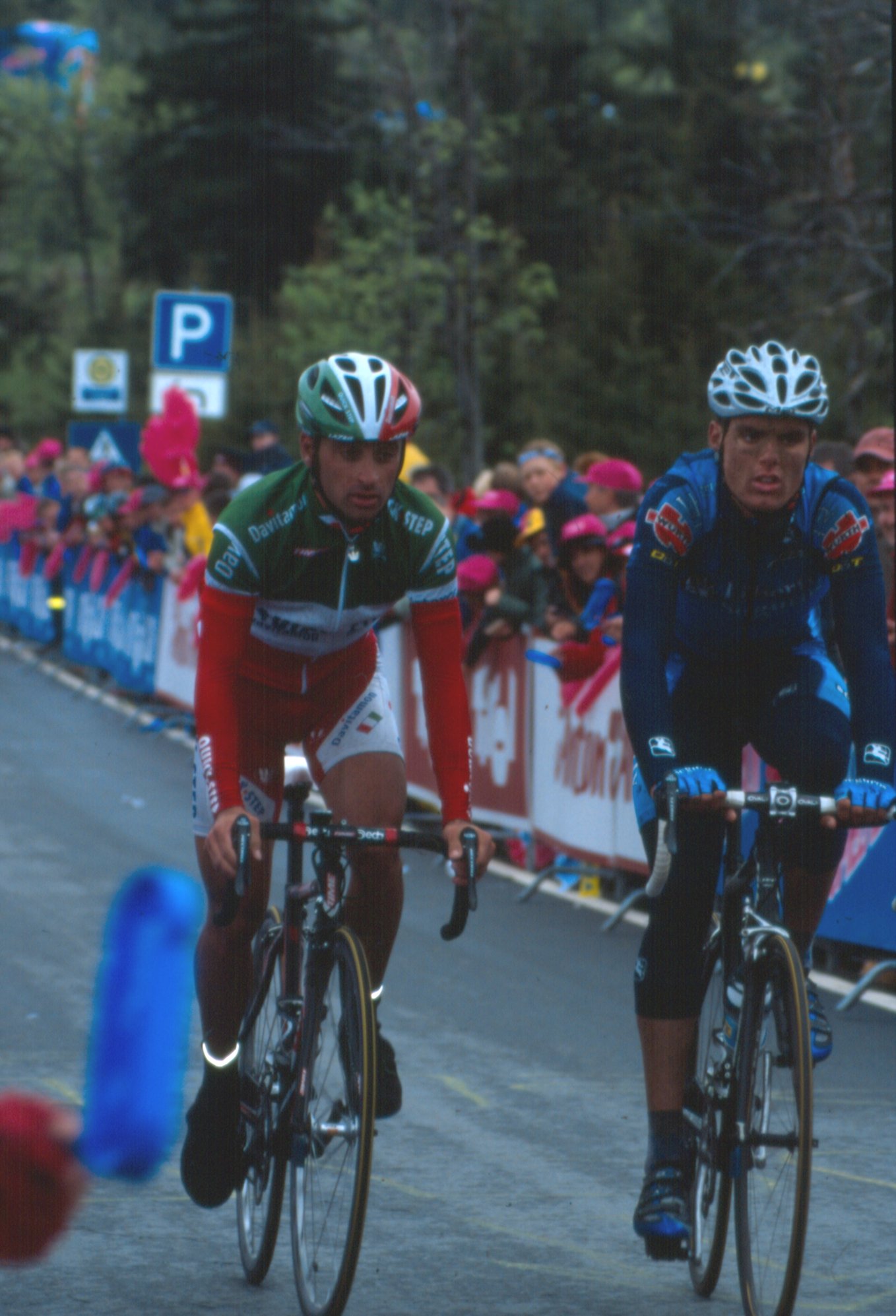
The 2004 season saw Bettini continue his strong form, starting well at Milan-San Remo. However, Davide Rebellin achieved an unprecedented triple victory in the Ardennes classics: La Flèche Wallonne, Liège-Bastogne-Liège, and Amstel Gold Race. Bettini's season was marked by further disappointments, including second-place finishes in the HEW Cyclassics and the Clásica de San Sebastián, races he had previously won. Despite these setbacks, points gained in Paris-Tours put him in the leader's jersey. With the final race, the Giro di Lombardia, being more suited to Rebellin, the World Cup was not yet secure. Bettini closely marked Rebellin throughout the race, frustrating his rival to the point of quitting, thus earning Bettini his third consecutive UCI World Cup title.
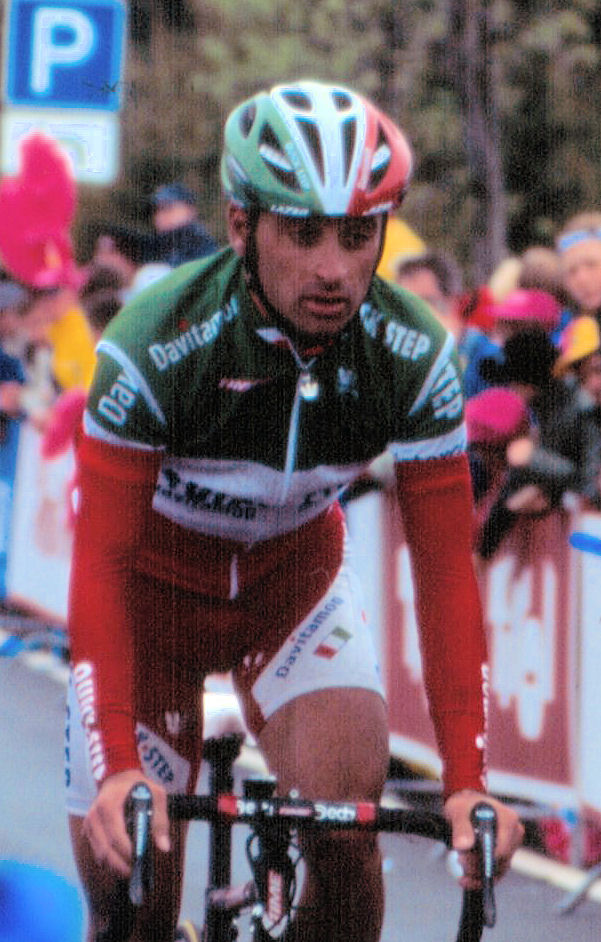
3.2. Olympic and World Championship Success
Paolo Bettini achieved some of the most significant victories of his career in the Olympic Games and UCI Road World Championships. His most important victory came at the 2004 Summer Olympics in Athens, where he secured the gold medal in the men's individual road race. He broke away with Portuguese rider Sérgio Paulinho and, after a comfortable lead, won the final sprint. Later that year, he was unable to contend for the World Championship due to an injury sustained early in the race when he banged his knee against the team car.
In 2006, Bettini finally achieved his long-sought rainbow jersey by winning the World Road Race Championship in Salzburg. This victory was particularly poignant, as his brother, Sauro, tragically died in a car accident just a few days after. Despite being close to abandoning cycling due to grief, Bettini decided to continue and, in an emotional display, went on to win the Giro di Lombardia in tears, pointing to the sky as he crossed the finish line. He later stated that this victory was more meaningful to him than his Olympic or World Championship titles, feeling that he was not pedaling alone. His exceptional performance in 2006 earned him the prestigious Vélo d'Or award as the best rider of the year.
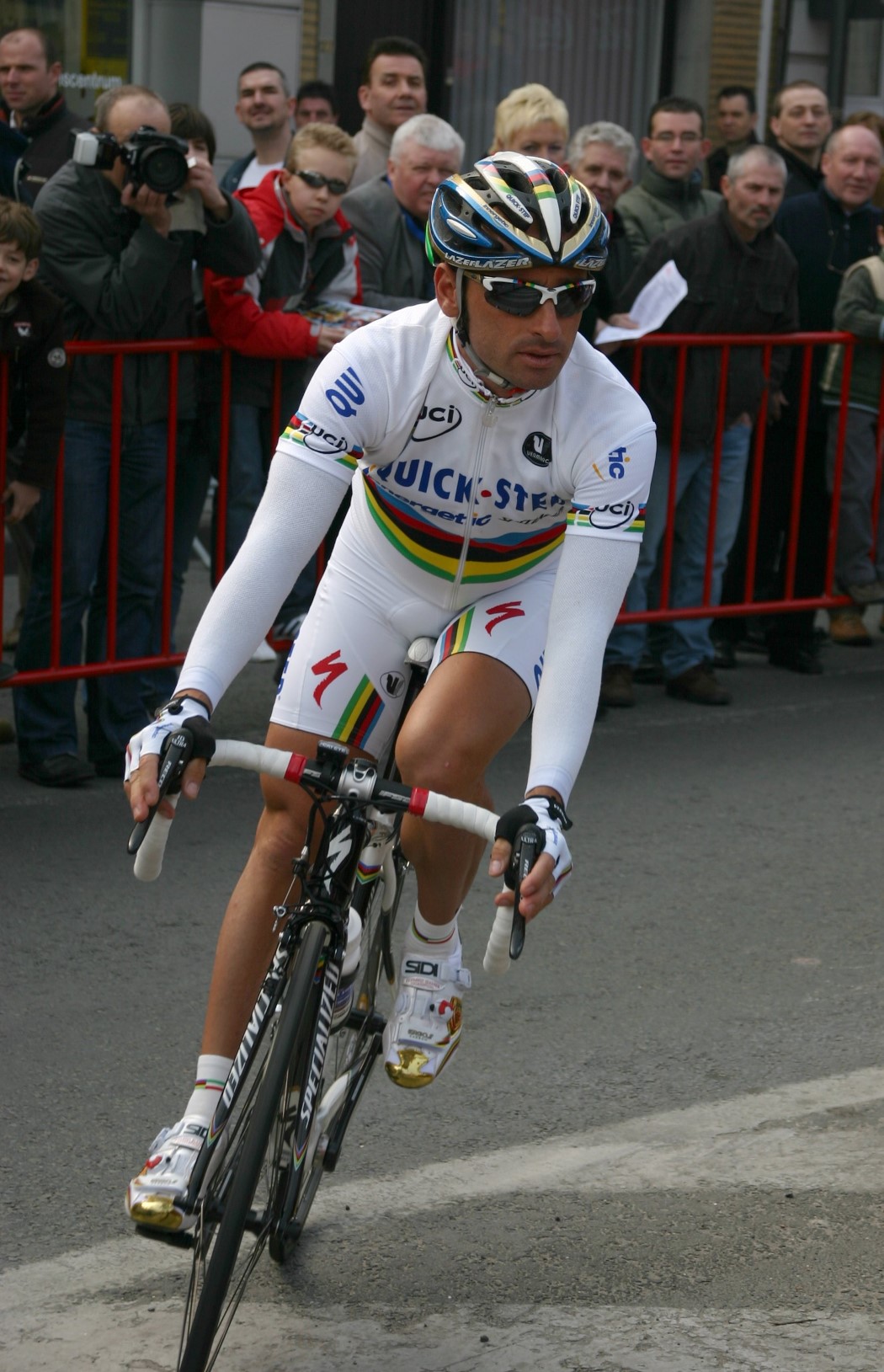
The 2007 season saw Bettini proudly wear the rainbow jersey. Although he secured fewer major victories that year, with only one stage win at the 2007 Vuelta a España, he successfully defended his title at the World Road Race Championship in Stuttgart. This second consecutive victory was achieved despite facing doping allegations and intense pressure, demonstrating his exceptional race management and mental fortitude. He became the first rider since Gianni Bugno (1991-1992) and only the fifth in the history of the World Championships to achieve back-to-back titles.
3.3. Classics Specialist
Paolo Bettini is widely recognized as one of the greatest classics specialists of his era, and arguably one of the strongest of all time. His aggressive racing style and ability to excel on varied terrains made him a formidable competitor in prestigious one-day races.
3.3.1. Major Classics Victories
Bettini's impressive palmarès includes multiple victories in cycling's Monument races and other significant classics:
- Liège-Bastogne-Liège: 2000, 2002
- Milan-San Remo: 2003
- Giro di Lombardia: 2005, 2006
- Züri-Metzgete: 2001, 2005
- HEW Cyclassics: 2003
- Clásica de San Sebastián: 2003
- Tirreno-Adriatico: 2004
3.4. Grand Tour Achievements
While primarily known for his success in one-day classics, Paolo Bettini also achieved notable results in Grand Tours, securing multiple stage victories and winning the Points Classification in the Giro d'Italia.
In the 2000 Tour de France, he secured a stage victory (Stage 9). During the 2005 Giro d'Italia, Bettini claimed two stage wins and wore the pink jersey as the leader of the general classification for several days. He also won the Points Classification in both the 2005 and 2006 editions of the Giro. His success extended to the Vuelta a España, where he won Stage 16 in 2005 by defeating Alessandro Petacchi in an uphill sprint. He continued his stage-winning streak in the Vuelta, taking Stage 2 in 2006, Stage 3 in 2007, and two more stages (Stage 6 and Stage 12) in 2008.
The following table summarizes his general classification results in Grand Tours:
| Grand Tour | 1997 | 1998 | 1999 | 2000 | 2001 | 2002 | 2003 | 2004 | 2005 | 2006 | 2007 | 2008 |
|---|---|---|---|---|---|---|---|---|---|---|---|---|
| Giro d'Italia | 25 | 7 | 44 | - | - | DNF | - | - | 38 | 56 | 41 | 19 |
| Tour de France | - | - | - | 122 | 74 | - | 114 | 114 | - | - | - | - |
| Vuelta a España | - | - | 32 | - | - | - | - | - | DNF | DNF | DNF | DNF |
3.5. National Championship
Paolo Bettini was a two-time winner of the Italian National Road Race Championship. He first claimed the national title in 2003 and repeated his success in 2006, showcasing his consistent dominance within his home country.
4. Race Style and Nickname
Paolo Bettini was renowned for his distinctive and aggressive racing style, which earned him the nickname Il Grillo (Il GrilloThe CricketItalian). This moniker perfectly captured his tendency for repeated, sudden attacks and his explosive sprinting capabilities. Despite his relatively small stature, standing at 67 in (169 cm) and weighing 128 lb (58 kg), Bettini possessed surprising power, making him a formidable puncher capable of handling short, steep climbs.
His unique physical attributes and tactical approach made him an exceptional classics specialist. While he might have been outmatched by pure sprinters in mass finishes or by elite climbers on high mountain passes, Bettini's strength lay in his versatility. One-day races, characterized by high average speeds and numerous short, undulating climbs, played directly to his strengths. He could effectively drop heavier sprinters on ascents and then either launch immediate sprints or attack on flat sections before the mountains to distance pure climbers. When race finishes involved uphill gradients, Bettini excelled by accelerating on the preceding flat sections to shed power-deficient climbers, then unleashing a powerful sprint that heavier sprinters struggled with on the incline.
In Grand Tours and other stage races, Bettini often targeted stages with similar rolling terrain or those where point differentials were not solely based on difficulty. This strategy allowed him to consistently accumulate points, leading to his victories in the Points Classification at the Giro d'Italia and numerous stage wins in both the Giro and Vuelta a España. A notable characteristic of his career was his remarkable consistency throughout the season and his exceptional ability to peak his form for specific target races, particularly the classics, rarely experiencing significant dips in performance.
5. Personal Life and Episodes
Paolo Bettini married Monica Orlandini, a literature teacher, in 2000. The couple made their home in Riparbella, a town located 6.2 mile (10 km) from Cecina, Bettini's birthplace. Their residence was a farmhouse belonging to his wife's family, who had been olive farmers for four generations.
Bettini's career was marked by both triumph and personal tragedy. In 2006, just days after he achieved his long-awaited World Championship victory, his brother, Sauro, died in a car accident. This devastating loss deeply affected Bettini, bringing him close to abandoning cycling altogether. However, he ultimately chose to continue, and in an emotionally charged performance, he went on to win the Giro di Lombardia. He crossed the finish line in tears, pointing to the sky, and later expressed that this victory, achieved amidst profound grief, was more meaningful to him than his Olympic or World Championship titles, as he felt he was not pedaling alone.
Throughout his career, Bettini was known for his distinctive use of gold accents on his helmets and shoes. He even once rode a road bike where the frame, bar tape, wheels, and saddle were all colored gold. His helmet featured a custom gold plate embedded with diamonds, a design also used by other prominent cyclists like Tom Boonen.
Bettini was involved in several notable incidents during his career. In 2007, during the 2007 Vuelta a España, he was leading the points classification but withdrew from the race prematurely to prepare for the World Championships. On the final stage he rode, he controversially wore his rainbow jersey as World Champion instead of the points leader's jersey, reportedly incurring a significant penalty from the organizers. At the finish line of the 2007 World Championship, Bettini made a "gun-shooting" gesture, which was interpreted by some as an expression of frustration towards the organizers regarding doping issues, drawing criticism. In another unfortunate event on October 6, 2007, his team car was robbed, and among the stolen items was the very bicycle he had used to win his second consecutive World Championship just a week prior, marking the second major tragedy he faced after a World Championship victory.
In 2008, during the 2008 Giro d'Italia, Bettini demonstrated his dedication as a teammate by selflessly assisting Giovanni Visconti, who was wearing the pink jersey as the race leader. Notably, in Stage 7, Bettini took on the responsibility of monitoring the movements of Visconti's direct rivals and provided crucial support, helping Visconti retain the pink jersey.
Bettini also ventured into track cycling, following a tradition of road riders competing in six-day races during the winter. He participated in events in Munich and Grenoble in 2006, stating that he did it purely for his love of racing and to experience track competition, not for financial gain. His track debut was initially described as "catastrophic" due to difficulties in the madison relay race, where he struggled to connect with his partner. However, he quickly adapted, and by the end of the first night, he had earned the respect of other riders, performing proper changes and improving significantly.
6. Retirement and Coaching Career
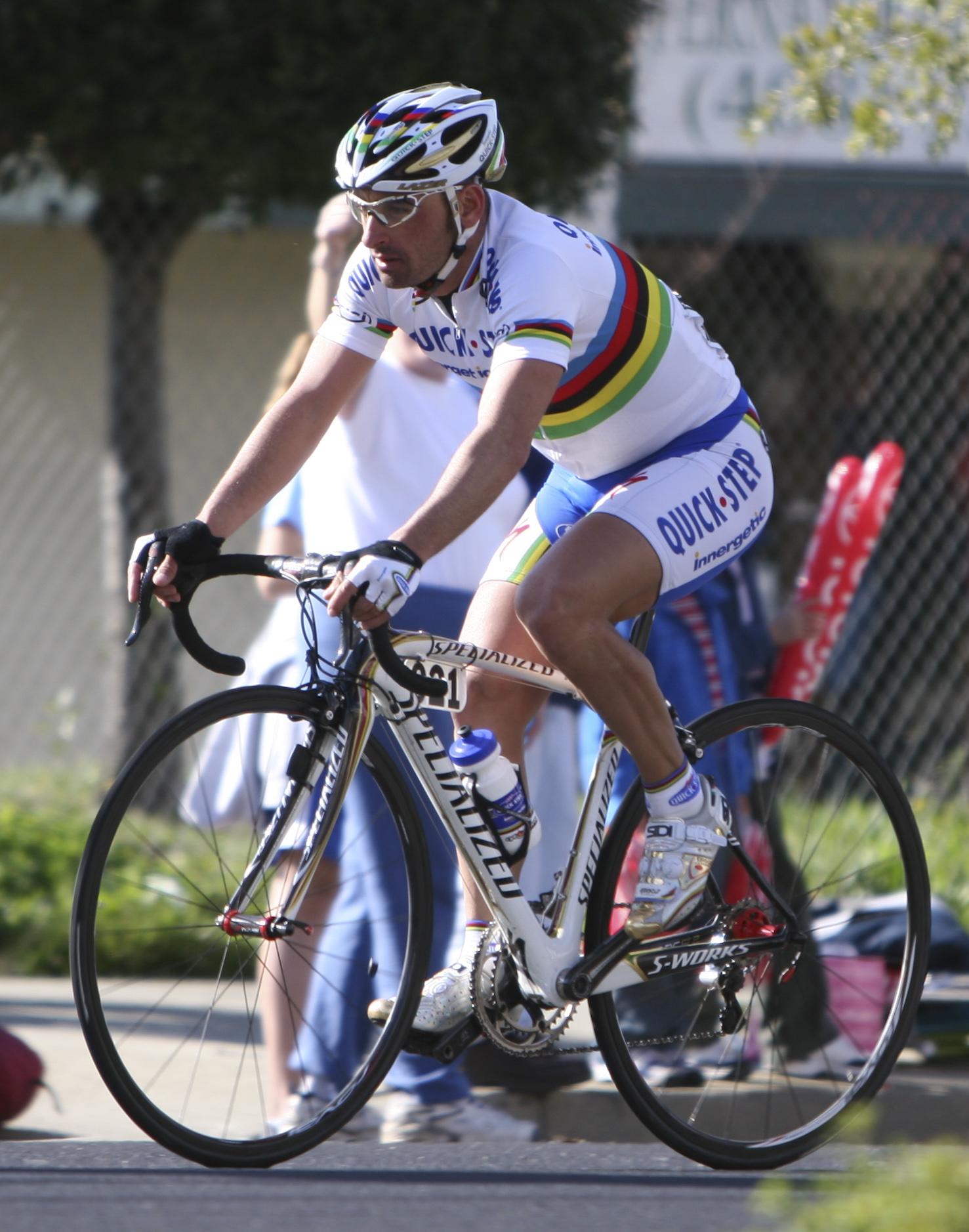
Paolo Bettini's final season as a professional cyclist in 2008 was marred by injuries, including a fall at the Kuurne-Brussels-Kuurne and a broken rib sustained during a wet descent at the Tour of the Basque Country. Despite these setbacks, he secured victories at the Trofeo Matteotti and won stages in the Tour of Austria and Tour de Wallonie. He also claimed two more stage wins at the 2008 Vuelta a España. During the Vuelta, he announced his decision to leave the Quick Step team after a decade, citing a financial dispute as the reason, especially after the team signed Stefan Schumacher, a rider with a similar racing profile (though Schumacher's contract was later voided due to doping violations).
On September 27, 2008, the day before the men's individual road race at the World Championships in Varese, Bettini officially announced his retirement from professional cycling. Shortly after his retirement, on November 4, he suffered a fall during the Milan six-day track event and was hospitalized after losing consciousness.
Following his illustrious racing career, Bettini transitioned into coaching. On June 17, 2010, he was appointed as the new coach of the Italian national cycling team, succeeding Franco Ballerini, who had tragically died in a car accident earlier that year. Bettini held this position until 2014, when he departed to collaborate with Fernando Alonso on the Formula 1 driver's new cycling team, which was being prepared for its launch in 2015.
7. Assessment and Legacy
Paolo Bettini's career stands as a testament to his versatility, aggressive spirit, and remarkable consistency, solidifying his legacy as one of cycling's most accomplished and exciting riders. His ability to launch decisive attacks and deliver powerful sprints earned him the fitting nickname 'Il Grillo' (The Cricket), embodying his dynamic presence in the peloton.
Bettini's impact on the sport is defined by his unparalleled success in one-day classics, where he was widely considered the finest specialist of his generation. His three consecutive UCI Road World Cup titles (2002-2004) and his unique achievement of winning Milan-San Remo, HEW Cyclassics, and Clásica de San Sebastián in a single season (2003) underscore his dominance in these prestigious events. Beyond the classics, his gold medal at the 2004 Athens Olympics and his historic back-to-back World Championship victories in 2006 and 2007 cemented his status as a true champion on the global stage.
His career was not without its emotional challenges, most notably the tragic death of his brother in 2006, which he channeled into an inspiring victory at the Giro di Lombardia. This blend of raw emotion, strategic brilliance, and sheer physical power made Bettini a captivating figure in professional cycling. His transition into coaching the Italian national team further extended his influence, allowing him to impart his vast experience to a new generation of riders. Bettini's legacy is that of a tenacious competitor who achieved nearly every major honor in road cycling, leaving an indelible mark on the sport through his distinctive style and numerous triumphs.